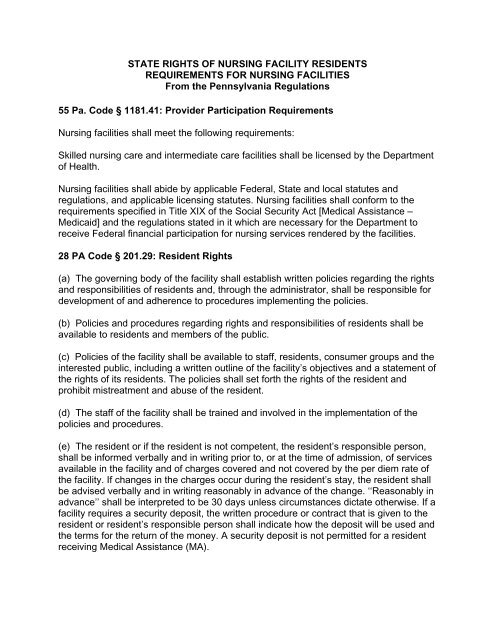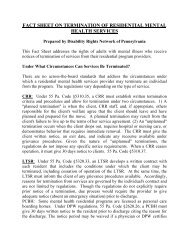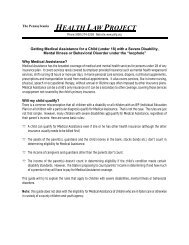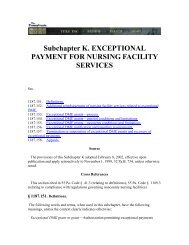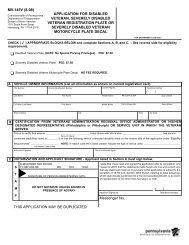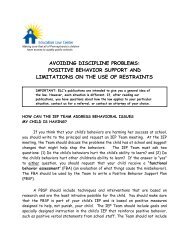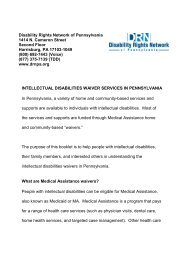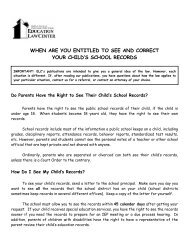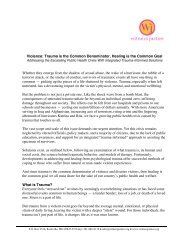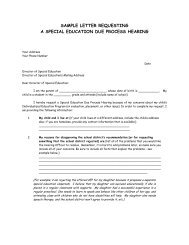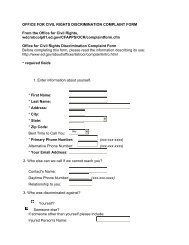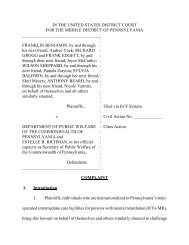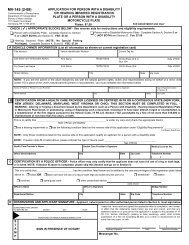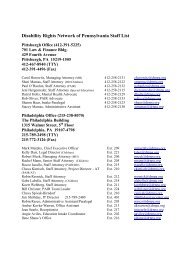STATE RIGHTS OF NURSING FACILITY RESIDENTS ...
STATE RIGHTS OF NURSING FACILITY RESIDENTS ...
STATE RIGHTS OF NURSING FACILITY RESIDENTS ...
You also want an ePaper? Increase the reach of your titles
YUMPU automatically turns print PDFs into web optimized ePapers that Google loves.
<strong>STATE</strong> <strong>RIGHTS</strong> <strong>OF</strong> <strong>NURSING</strong> <strong>FACILITY</strong> <strong>RESIDENTS</strong><br />
REQUIREMENTS FOR <strong>NURSING</strong> FACILITIES<br />
From the Pennsylvania Regulations<br />
55 Pa. Code § 1181.41: Provider Participation Requirements<br />
Nursing facilities shall meet the following requirements:<br />
Skilled nursing care and intermediate care facilities shall be licensed by the Department<br />
of Health.<br />
Nursing facilities shall abide by applicable Federal, State and local statutes and<br />
regulations, and applicable licensing statutes. Nursing facilities shall conform to the<br />
requirements specified in Title XIX of the Social Security Act [Medical Assistance –<br />
Medicaid] and the regulations stated in it which are necessary for the Department to<br />
receive Federal financial participation for nursing services rendered by the facilities.<br />
28 PA Code § 201.29: Resident Rights<br />
(a) The governing body of the facility shall establish written policies regarding the rights<br />
and responsibilities of residents and, through the administrator, shall be responsible for<br />
development of and adherence to procedures implementing the policies.<br />
(b) Policies and procedures regarding rights and responsibilities of residents shall be<br />
available to residents and members of the public.<br />
(c) Policies of the facility shall be available to staff, residents, consumer groups and the<br />
interested public, including a written outline of the facility’s objectives and a statement of<br />
the rights of its residents. The policies shall set forth the rights of the resident and<br />
prohibit mistreatment and abuse of the resident.<br />
(d) The staff of the facility shall be trained and involved in the implementation of the<br />
policies and procedures.<br />
(e) The resident or if the resident is not competent, the resident’s responsible person,<br />
shall be informed verbally and in writing prior to, or at the time of admission, of services<br />
available in the facility and of charges covered and not covered by the per diem rate of<br />
the facility. If changes in the charges occur during the resident’s stay, the resident shall<br />
be advised verbally and in writing reasonably in advance of the change. ‘‘Reasonably in<br />
advance’’ shall be interpreted to be 30 days unless circumstances dictate otherwise. If a<br />
facility requires a security deposit, the written procedure or contract that is given to the<br />
resident or resident’s responsible person shall indicate how the deposit will be used and<br />
the terms for the return of the money. A security deposit is not permitted for a resident<br />
receiving Medical Assistance (MA).
(f) The resident shall be transferred or discharged only for medical reasons, for his<br />
welfare or that of other residents or for nonpayment of stay if the facility has<br />
demonstrated reasonable effort to collect the debt. Except in an emergency, a resident<br />
may not be transferred or discharged from the facility without prior notification. The<br />
resident and the resident’s responsible person shall receive written notification in<br />
reasonable advance of the impending transfer or discharge. Reasonable advance<br />
notice shall be interpreted to mean 30 days unless appropriate plans which are<br />
acceptable to the resident can be implemented sooner. The facility shall inform the<br />
resident of its bed-hold policy, if applicable, prior to discharge. The actions shall be<br />
documented on the resident record. Suitable clinical records describing the resident’s<br />
needs, including list of orders and medications as directed by the attending physician<br />
shall accompany the resident if the resident is sent to another medical facility.<br />
(g) Unless the discharge is initiated by the resident or resident’s responsible person,<br />
the facility is responsible to assure that appropriate arrangements are made for a safe<br />
and orderly transfer and that the resident is transferred to an appropriate place that is<br />
capable of meeting the resident’s needs. Prior to transfer, the facility shall inform the<br />
resident or the resident’s responsible person as to whether the facility where the<br />
resident is being transferred is certified to participate in the Medicare and MA<br />
reimbursement programs.<br />
(h) It is not necessary to transfer a resident whose condition had changed within or<br />
between health care facilities when, in the opinion of the attending physician, the<br />
transfer may be harmful to the physical or mental health of the resident. The physician<br />
shall document the situation accordingly on the resident’s record.<br />
(i) The resident shall be encouraged and assisted throughout the period of stay to<br />
exercise rights as a resident and as a citizen and may voice grievances and<br />
recommend changes in policies and services to the facility staff or to outside<br />
representatives of the resident’s choice. The resident or resident’s responsible person<br />
shall be made aware of the Department’s Hot Line (800) 254-5164, the telephone<br />
number of the Long-Term Care Ombudsman Program located within the Local Area<br />
Agency on Aging, and the telephone number of the local Legal Services Program to<br />
which the resident may address grievances. A facility is required to post this information<br />
in a prominent location and in a large print easy to read format.<br />
(j) The resident shall be treated with consideration, respect and full recognition of<br />
dignity and individuality, including privacy in treatment and in care for the necessary<br />
personal and social needs.<br />
(k) The resident shall be permitted to retain and use personal clothing and possessions<br />
as space permits unless to do so would infringe upon rights of other residents and<br />
unless medically contraindicated, as documented by his physician in the medical record.<br />
Reasonable provisions shall be made for the proper handling of personal clothing and<br />
possessions that are retained in the facility. The resident shall have access and use of<br />
these belongings.
(l) The resident’s rights are to be decided by the resident’s responsible person when:<br />
(1) When the resident is adjudicated incapacitated by a court.<br />
(2) As Pennsylvania law otherwise authorizes.<br />
(m) The resident rights in this section shall be reflected in the policies and procedures<br />
of the facility.<br />
(n) The facility shall post in a conspicuous place near the entrances and on each floor<br />
of the facility a notice which sets forth the list of resident’s rights. The facility shall on<br />
admission provide a resident or resident’s responsible person with a personal copy of<br />
the notice. In the case of a resident who cannot read, write or understand English,<br />
arrangements shall be made to ensure that this policy is fully communicated to the<br />
resident. A certificate of the provision of personal notice as required in this section shall<br />
be entered in the resident’s clinical record.<br />
(o) Experimental research or treatment in a nursing home may not be carried out<br />
without the approval of the Department and without the written approval of the resident<br />
after full disclosure. For the purposes of this subsection, ‘‘experimental research’’<br />
means an experimental treatment or procedure that is one of the following:<br />
(1) Not a generally accepted practice in the medical community.<br />
(2) Exposes the resident to pain, injury, invasion of privacy or asks the resident to<br />
surrender autonomy, such as a drug study.


